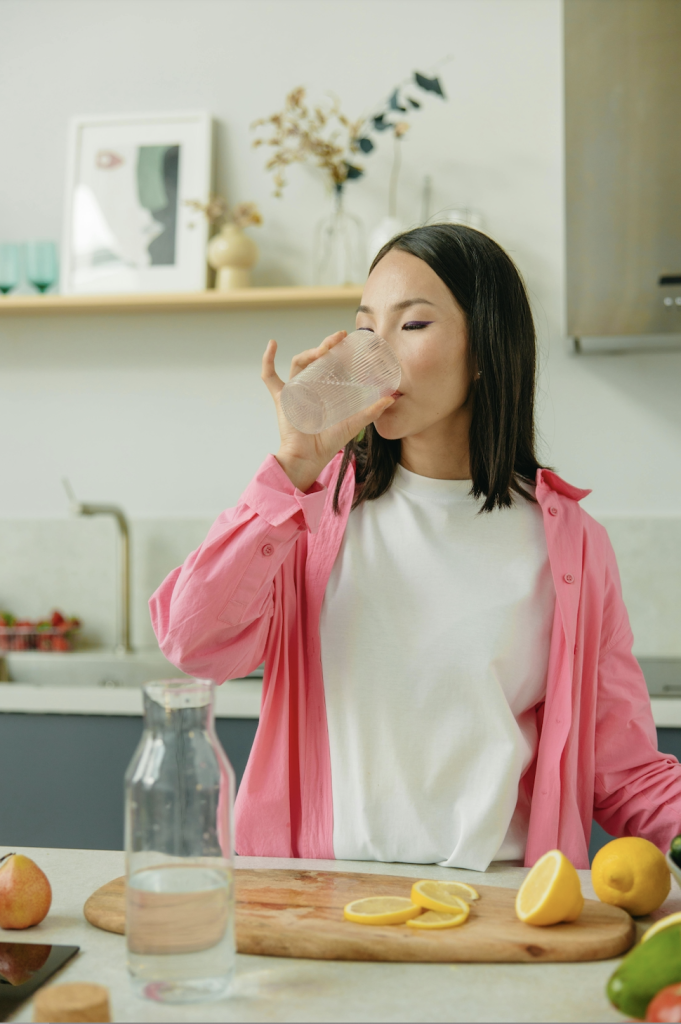Unlock Your Best Self: The Amazing Benefits of Drinking More Water Daily
Water. It’s essential for life, yet so many of us struggle to drink enough. Our bodies are roughly 60-65% water, playing a vital role in everything from regulating our temperature to flushing out toxins. But are you getting enough? In this post, we’ll dive into the science-backed reasons why staying hydrated is crucial, explore the incredible benefits you’ll experience, and share practical tips to help you boost your daily water intake.

The Science of Hydration: Why Water Matters
Water isn’t just important; it’s fundamental. It’s involved in countless bodily functions, including:
- Temperature Regulation: Sweating helps cool us down, preventing overheating during exercise or hot weather. (Beigtan et al., 2024)
- Digestion and Metabolism: Water aids in breaking down food, nutrient absorption, and preventing constipation. (Miller et al., 2021)
- Energy Levels: Dehydration can lead to brain fog and decreased concentration. Staying hydrated keeps your mind sharp. (Miller et al., 2021)
- Detoxification: Water helps your kidneys flush out waste and toxins through urine. (Popkin et al., 2010)
- Skin Health: Hydrated skin looks plumper and healthier. Water contributes to skin thickness and overall appearance. (Popkin et al., 2010)
- Weight Management: Drinking water can help you feel full, potentially aiding in weight loss. Studies have even shown a link between increased water intake and weight and fat loss in overweight women. (Stookey et al., 2008)
“To boost gut health, hydration is key. Learn more in “How to Heal Your Gut Health for Beginners“.
Simple Strategies to Increase Your Water Intake
Making hydration a habit doesn’t have to be a chore. Here are some easy ways to drink more water:
- Track Your Intake: Use a marked water bottle to monitor your progress throughout the day. Check out our store for more drink bottle options like our crystal-infused water bottles.
- Set Reminders: Use your phone’s alarm to remind you to drink water regularly.
- Infuse Your Water: Add slices of lemon, lime, cucumber, berries, or mint for a refreshing flavour. You could also try our “Ginger, Turmeric, Mint and Lemon Drink Recipe” which boosts hydration, as well as many other health benefits.
- Eat Hydrating Foods: Incorporate water-rich fruits and vegetables like watermelon, cucumbers, and citrus fruits into your diet.
- Use a Straw: Some people find it easier to drink more with a straw. Choose eco-friendly options!
How Much Water Do You Need?
The recommended daily water intake varies based on factors like sex, age, weight, activity level, and climate. As a general guideline:
- Men: 3.7 liters (15.5 cups)
- Women: 2.7 liters (11.5 cups) (Sawka et al., 2005)
For a more personalized estimate, you can use a water intake calculator.
Hydration is important for fitness and body goals. Check out “Can Cycle-Syncing Workouts Help You Reach Your Body Goals?” blog post here.
The Ripple Effect: A Healthier You
Staying hydrated offers a wealth of benefits, contributing to your overall well-being. It’s a simple yet powerful way to invest in your health.
Conclusion:
Drinking enough water is a cornerstone of good health. By making conscious efforts to increase your water intake, you can experience significant improvements in your energy levels, skin health, digestion, and more. So, grab your water bottle and start hydrating your way to a healthier, happier you!
What are your favourite ways to stay hydrated? Share your tips in the comments below!
Until next time,
Greta @How To Turn Your Life Around
References:
Alpert, P. (2005). Sharing the secrets of life without water. Integrative and Comparative Biology, 45(5), 683–684. https://doi.org/10.1093/icb/45.5.683
Beigtan, M., Gonçalves, M., & Weon, B. M. (2024). Heat Transfer by Sweat Droplet Evaporation. Environ Sci Technol. 58(15):6532-6539. https://pubs.acs.org/doi/abs/10.1021/acs.est.4c00850
Miller, J. D., Workman, C. L., Panchang, S. V., Sneegas, G., Adams, E. A., Young, S. L., & Thompson, A. L. (2021). Water security and nutrition: Current knowledge and research opportunities. Advances in Nutrition, 12(6), 2525–2539. https://doi.org/10.1093/advances/nmab075
Popkin, B. M., D’Anci, K. E., & Rosenberg, I. H. (2010). Water, hydration, and health. Nutrition Reviews, 68(8), 439–458. https://doi.org/10.1111/j.1753-4887.2010.00304.x
Sawka, M. N., Cheuvront, S. N., & Carter, R., III. (2005). Human water needs. Nutrition Reviews, 63(6 Pt 2), S30–S39. https://doi.org/10.1111/j.1753-4887.2005.tb00152.x
Stookey, J. D., Constant, F., Popkin, B. M., & Gardner, C. D. (2008). Drinking water is associated with weight loss in overweight dieting women independent of diet and activity. Obesity (Silver Spring), 16(11), 2481–2488. https://doi.org/10.1038/oby.2008.409
Water Science School. (2019, May 22). The water in you: Water and the human body. U.S. Geological Survey. https://www.usgs.gov/special-topics/water-science-school/science/water-you-water-and-human-body#:~:text=By%20one%20year%20of%20age,their%20bodies%20made%20of%20water
Disclaimer:
The contents of this article pertaining to the intake of water are for general information purposes only. This article does not provide, and should not be construed to provide, any medical advice. Every person’s hydration needs differ according to age, gender, physical activity level, any pre-existing health conditions, and where they live. We recommend consulting your healthcare provider before making any drastic changes to your dietary intake or drinking patterns.
Though we endeavour to be correct and sufficiently researched, the material found in the article may include mistakes, inaccuracies or content that might not be current. We accept that sometimes human error results in incorrect links to articles being circulated. If something does not seem right, please let us know, and we will rectify the error as soon as we can.
We encourage readers to verify claims made in this blog and obtain additional professional insight where necessary. By reading or participating in this blog, the user agrees to indemnify the site and the authors of the blog against any patent and hidden damages caused directly or indirectly from policies, recommendations or information given on this website.